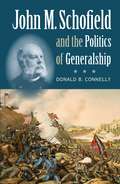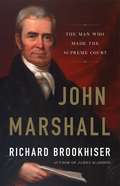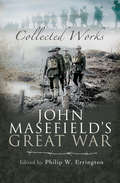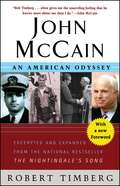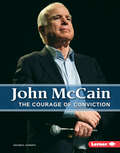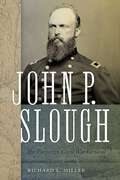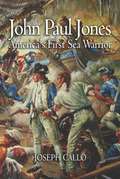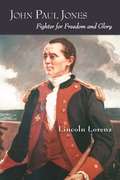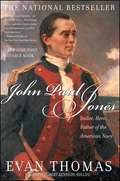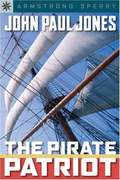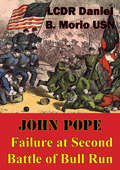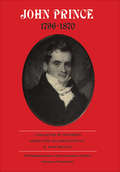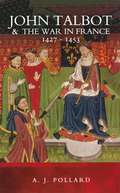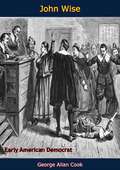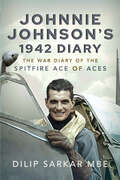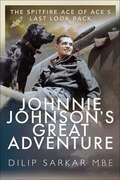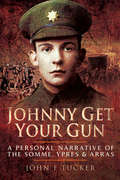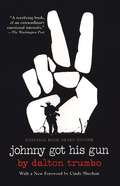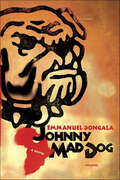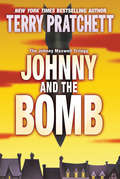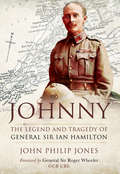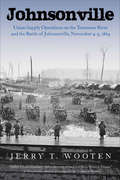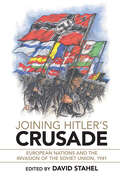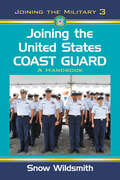- Table View
- List View
John M. Schofield and the Politics of Generalship
by Donald B. ConnellyIn the first full biography of Lieutenant General John McAllister Schofield (1831-1906), Donald B. Connelly examines the career of one of the leading commanders in the western theater during the Civil War. In doing so, Connelly illuminates the role of politics in the formulation of military policy, during both war and peace, in the latter half of the nineteenth century.Connelly relates how Schofield, as a department commander during the war, had to cope with contending political factions that sought to shape military and civil policies. Following the war, Schofield occupied every senior position in the army--including secretary of war and commanding general of the army--and became a leading champion of army reform and professionalism. He was the first senior officer to recognize that professionalism would come not from the separation of politics and the military but from the army's accommodation of politics and the often contentious American constitutional system. Seen through the lens of Schofield's extensive military career, the history of American civil-military relations has seldom involved conflict between the military and civil authority, Connelly argues. The central question has never been whether to have civilian control but rather which civilians have a say in the formulation and execution of policy.
John Marshall: The Man Who Made the Supreme Court
by Richard BrookhiserThe life of John Marshall, Founding Father and America's premier chief justice In 1801, a genial and brilliant Revolutionary War veteran and politician became the fourth chief justice of the United States. He would hold the post for 34 years (still a record), expounding the Constitution he loved. Before he joined the Supreme Court, it was the weakling of the federal government, lacking in dignity and clout. After he died, it could never be ignored again. Through three decades of dramatic cases involving businessmen, scoundrels, Native Americans, and slaves, Marshall defended the federal government against unruly states, established the Supreme Court's right to rebuke Congress or the president, and unleashed the power of American commerce. For better and for worse, he made the Supreme Court a pillar of American life. In John Marshall, award-winning biographer Richard Brookhiser vividly chronicles America's greatest judge and the world he made.
John Masefield's Great War: Collected Works
by John MasefieldJohn Masefield wrote four books on The Great War: Gallipoli, The Old Front Line, War and the Future and Battle of the Somme. These have been acclaimed as perceptive and beautiful crafted works, which bring home the full horror and hopelessness of war. This is the first opportunity for historians and general readers to purchase all four in a handsome yet reasonably priced volume, which is definitely a collectable. In addition there is a full introduction by Dr. Philip Errington, the leading Masefield authority who is head of Sotheby's Department of Printed Books and Manuscripts. This rare collection is rounded off by a selection of shorter pieces by the hugely popular Poet Laureate.
John McCain: An American Odyssey
by Robert TimbergRobert Timberg, an award-winning Washington journalist, is a 1964 U. S. Naval Academy graduate and a Marine veteran of the Vietnam war. He was The Baltimore Sun's White House correspondent during the Reagan presidency.
John McCain: The Courage of Conviction (Gateway Biographies Ser.)
by Heather E SchwartzThis timely title examines the remarkable life and death of John McCain, from his time as a decorated war veteran to elder statesman. Accessible text and plentiful photos cover McCain's early life, his military career, his political legacy, and his 2017 diagnosis of brain cancer. Up-to-the-minute details round out this latest look at a uniquely American figure.
John P. Slough: The Forgotten Civil War General
by Richard L. MillerJohn Potts Slough, the Union commander at the Battle of Glorieta Pass, lived a life of relentless pursuit for success that entangled him in the turbulent events of mid-nineteenth-century America. As a politician, Slough fought abolitionists in the Ohio legislature and during Kansas Territory&’s fourth and final constitutional convention. He organized the 1st Colorado Volunteer Infantry after the Civil War broke out, eventually leading his men against Confederate forces at the pivotal engagement at Glorieta Pass. After the war, as chief justice of the New Mexico Territorial Supreme Court, he struggled to reform corrupt courts amid the territory&’s corrosive Reconstruction politics.Slough was known to possess a volcanic temper and an easily wounded pride. These traits not only undermined a promising career but ultimately led to his death at the hands of an aggrieved political enemy who gunned him down in a Santa Fe saloon. Recounting Slough&’s timeless story of rise and fall during America&’s most tumultuous decades, historian Richard L. Miller brings to life this extraordinary figure.
John Paul Jones
by Joseph CalloThis fresh look at America's first sea warrior avoids the hero worship of past biographies and provides a more complete understanding of his accomplishments. Writing from the perspective of a naval officer with more than thirty years of experience and a seaman with a lifetime of sailing know-how, Callo examines Jones' extraordinary career by going beyond his legendary naval achievements to establish him as a key player in the American Revolution. Analyzing his relationships with important civilian leaders of the Revolution, such as Benjamin Franklin, the author demonstrates how Jones' handling of those often difficult dealings contributed to the nation's concept of civilian control of the military. In this acclaimed biography, Jones is shown to be not only a highly-skilled and relentless commander, but the first serving American naval officer to emphasize the role the Navy could play in the rise of the United States as a global power.
John Paul Jones
by Lincoln LorenzThis is the true life story of the Scottish gardener's son, John Paul, who became America's greatest naval hero, John Paul Jones. British midshipman, African slaver, traveling actor, merchant captain, accused of murder and suspected of freebooting-this was John Paul. Captain in Washington's Continental Navy, raider of the British coasts and victor in one of history's most desperate naval battles, lion of the French court and beloved by beautiful women, Russian admiral under Catherine the Great, and dead at 45, neglected by his adopted United States, his very grave lost for a hundred years-that was John Paul Jones.
John Paul Jones: Sailor, Hero, Father of the American Navy
by Evan ThomasRelive the American Revolution in this gripping biography of sailor John Paul Jones, remembered as the father of the American Navy.
John Paul Jones: The Pirate Patriot
by Armstrong SperryNewbery Medalist Armstrong Sperry tells the exciting story of the man who led a rag-tag continental navy to victory at sea.
John Pope - Failure At Second Battle Of Bull Run
by LCDR Daniel B. Morio USNWas the failure of the Army of Virginia at the Second Battle of Bull Run a result of General John Pope being a failure as a leader or were there other circumstances that helped him in his loss?General Pope had a long career in the Army that to the Second Battle of Bull Run had gone well. Pope had distinguished himself in the Mexican-American War and had done well early on in the western theater of operations during the Civil War. With his assumption of command in northern Virginia, Pope entered a realm in which he was unfamiliar, not welcomed by the troops he led and out of his league with regards to the Confederate leaders arrayed against him.Pope's paranoia regarding commanders who had come from General George McClellan's Army of the Potomac resulted in a lack of trust in first-hand accounts from senior officers as well as intelligence presented. This lack of trust resulted in his disregarding the fact that General Lee and Longstreet had moved 25,000 Confederate soldiers through Thoroughfare Gap and combined forces with General Jackson and deployed them along the right flank of Jackson's forces and perpendicular to Pope's force. This force than proceeded to assail the Union flank to nearly disastrous proportions.The fog of war has clouded the judgment of many generals throughout history and Pope was no exception. The fog of war negatively affected his imagination and ability to think critically throughout the battle.
John Prince 1796-1870: A Collection of Documents
by R. Alan DouglasJohn Prince was a lawyer, farmer, military officer, politician, judge, and entrepreneur. Born at Hereford, England, in 1796, he emigrated to Upper Canada in 1833 because he was ashamed of his ne'er-do-well father. His interest in farming took him to Sandwich where he became involved in the many careers open to him. An unhappy and volatile man, he was constantly at odds with himself, his family, and his associates. As colonel of the Third Essex Regiment, he was sometimes unpredictable in his actions and on one occasion, during the Upper Canada Rebellion, unjustifiably violent – ordering the summary execution of five prisoners after the Battle of Windsor. As a politician, despite his haughty and melancholic nature and his erratic individualism, he held the loyalty of his constituents, representing Essex in the House of Assembly from 1836 to 1854 and the Western Districts in the Legislative Council from 1856 to 1860. In 1860, after a lifetime spent in politics, farming, railroading and mining speculations, and canal schemes, he obtained a long-sought judgeship in the new District of Algoma. Leaving his wife and children behind, he went off to his 'New Siberia,' where he continued his restless struggle to escape 'the importunities of mankind,' and where his long, tragic life ended in 1870. Entries from Prince's diary, excerpts from newspaper accounts, and letters give a vivid picture of the politics and life of his time. In his Introduction, R. Alan Douglas emphasizes the contribution made by the discovery of the diary to our perception of the people, places, and events of mid-nineteenth century North America. (Ontario Series of the Champlain Society, 11)
John Talbot & the War in France, 1427–1453
by A. J. PollardJohn Talbot, Earl of Shrewsbury was the last of the celebrated English commanders of the Hundred Years' War. In his lifetime his reputation for audacity and courage gave him an unrivalled fame among the English, and he was feared and admired by the French. A.J. Pollard, in this pioneering and perceptive account, reconstructs the long career of this extraordinary soldier and offers a fascinating insight into warfare in the late medieval period. Talbot was the last representative of generations of brave, brutal warriors whose appetite for glory and personal gain had sustained English policy in France since the time of Edward III. His defeat and death at the Battle of Castillon on 17 July 1453 marked the end of the wars. It was also the final act in a heroic but savage tradition.
John Wise: Early American Democrat
by George Allan CookA biography of the 17th to 18th century reverend and New England political figure John Wise, who lead his town in protest against an arbitrarily imposed tax, acted as spokesman for one of the earliest 'No taxation without representation' challenges, petitioned for two of the most vigorously prosecuted victims in the Salem witch trials, and who advocated many other causes during his life.
Johnnie Johnson's 1942 Diary: The War Diary of the Spitfire Ace of Aces
by Dilip SarkarA unique insight into how fighter pilots lived, loved—and died—through the diary of the top-scoring RAF Ace who survived the Battle of Britain. A one-time household name synonymous with the superlative Spitfire, Air Vice-Marshal &“Johnnie&” Johnson&’s aerial combat successes of World War II inspired schoolboys for generations. As a &“lowly Pilot Officer,&” Johnson learned his fighter pilot&’s craft as a protégé of the legless Tangmere Wing Leader, Douglas Bader. After Bader was brought down over France and captured on 9 August 1941, Johnnie remained a member of 616 (South Yorkshire) Squadron. By the beginning of 1942, when Johnnie&’s diary begins, Fighter Command was pursuing an offensive policy during daylight hours, &“reaching out&” and taking the war to the Germans in France. It was also a period in which the Focke-Wulf Fw outclassed the Spitfire Mk.V. In Johnnie&’s words, the Fw 190 &“drove us back to the coast and, for the first time, pilots lost confidence in the Spitfire.&” As well as his participation in Rhubarb and Circus sorties, Johnnie was also involved in Operation Jubilee on 19 August 1942. In this diary, published here for the first time, we get a glimpse of the real Johnnie, and what it was really like to live and breathe air-fighting during one of the European air war&’s most interesting years: 1942. Presented on a day-by-day basis, each of Johnnie&’s entries is supported by an informative narrative written by the renowned aviation historian Dilip Sarkar, drawing upon official documents and his interviews and correspondence with the great man. &“Provides a number of insights into life in the RAF Fighter Command of that period.—Most Highly Recommended.&” —Firetrench
Johnnie Johnson's Great Adventure: The Spitfire Ace of Ace's Last Look Back
by Dilip SarkarThe World War II fighter Ace&’s previously unpublished draft—an account of the &“Long Trek&” from Normandy into the heart of the Third Reich itself. Having published two of his own books, Wing Leader and The Circle of Air Fighting, Air Vice-Marshal Johnnie Johnson co-authored several more with another fighter ace, namely Wing Commander P.B. &“Laddie&” Lucas. In 1997, the &“AVM&” suggested to his friend, the prolific author Dilip Sarkar, that the pair should collaborate on The Great Adventure. &“Greycap Leader&” was to produce a draft, after which Dilip would add the historical detail and comment. Sadly, the project was unfulfilled, because Johnnie became ill and passed away, aged eighty-five, in 2001. Years later, Johnnie&’s eldest son, Chris, discovered the manuscript among his august father&’s papers. In order to keep Johnnie&’s memory evergreen, Chris turned to Dilip to finally see the project through to its conclusion. In this book Johnnie revisits certain aspects of his wartime service, including the development of tactical air cooperation with ground forces; his time as a Canadian wing leader in 1943, when the Spitfire Mk IX at last outclassed the Fw 190; and details his involvement in some of the most important battles of the defeat of Nazi Germany, including Operation Overlord and the D-Day landings in 1944, Operation Market Garden and the airborne assault at Arnhem, and the Rhine Crossings, throughout all of which Johnnie also commanded Canadian wings. Johnnie Johnson&’s Great Adventure &“brings to life the man of the book in such an interesting and heroic manner . . . if it wasn&’t for these brave heroes we might not have won the war&” (UK Historian).
Johnny Get Your Gun: A Personal Narrative of the Somme, Ypres & Arras
by John F. TuckerAt the age of seventeen-and-a-half, full of idealism and patriotism, John Tucker enlisted as an Infantryman in the London Kensington Regiment and reached France, after training, in August 1915. Against all odds he survived three years of bitter trench warfare, was seriously wounded, and returned to Blighty a few months before Armistice Day. During those years he took part in the Battle of the Somme, the battles of Arras and Cambrai, and the Third Battle of Ypres. Yet though his patriotism remained unflinching, his idealism gave way to the grim realities of day to day survival in the trenches and, as he began to understand what constitutes courage, he grew from boyhood to manhood.The author contrasts the beauties of the French countryside with the ugliness of widespread death and destruction, and paints a picture of French country life hardly less squalid than the soldiers' own lot. But above all, he makes the reader realise what it was like to fight in the war to end all wars.These are the memoirs of one Infantryman, but through his eyes a vivid canvas of the whole war gradually unfolds.
Johnny Got His Gun: Johnny Cogió Su Fusil (Film Ink Ser.)
by Dalton TrumboThe Searing Portrayal Of War That Has Stunned And Galvanized Generations Of ReadersAn immediate bestseller upon its original publication in 1939, Dalton Trumbo?s stark, profoundly troubling masterpiece about the horrors of World War I brilliantly crystallized the uncompromising brutality of war and became the most influential protest novel of the Vietnam era. Johnny Got His Gun is an undisputed classic of antiwar literature that?s as timely as ever.?A terrifying book, of an extraordinary emotional intensity.?--The Washington Post"Powerful. . . an eye-opener." --Michael Moore"Mr. Trumbo sets this story down almost without pause or punctuation and with a fury amounting to eloquence."--The New York Times"A book that can never be forgotten by anyone who reads it."--Saturday Review
Johnny Mad Dog: A Novel
by Emmanuel DongalaLife During Wartime, As Seen Through the Eyes of Two Congolese Teenagers Set amid the chaos of West Africa's civil wars, Emmanuel Dongala's striking novel tells the story of two teenagers growing up while rival ethnic groups fight for control of their country.At age sixteen, Johnny is a member of the Death Dealers, a rebel faction bent on seizing power. Even as he is drawn into the rebels' program of terror, Johnny Mad Dog, as he calls himself, retains his youthful exuberance--searching for girls, good times, and adventure. Sixteen-year-old Laokolé, for her part, dreams of finishing high school and becoming an engineer, but as rogue militias prepare to sack the city, she is forced to leave home with her mother and brother--and then finds herself alone and running from the likes of Johnny.Acclaimed in France, Johnny Mad Dog is a coming-of-age story like no other; Dongala's masterful use of dual narrators makes the novel an unusually vivid and affecting tale of the struggle to survive--and to retain one's humanity--in terrifying times.
Johnny and the Bomb
by Terry PratchettTwelve-year-old Johnny Maxwell has a knack for being in the wrong place at the wrong time. This has never been more true than when he finds himself in his hometown on May 21, 1941, over forty years before his birth!An accidental time traveler, Johnny knows his history. He knows England is at war, and he knows that on this day German bombs will fall on the town. It happened. It's history. And as Johnny and his friends quickly discover, tampering with history can have unpredictable--and drastic--effects on the future. But letting history take its course means letting people die. What if Johnny warns someone and changes history? What will happen to the future? If Johnny uses his knowledge to save innocent lives by being in the right place at the right time, is he doing the right thing? Mixing nail-biting suspense with outrageous humor, Terry Pratchett explores a classic time-travel paradox in Johnny Maxwell's third adventure.
Johnny: The Legend and Tragedy of General Sir Ian Hamilton
by John Philip JonesThe Gallipoli campaign was launched in April 1915 in an effort to knock Turkey out of the war but the force that was deployed was too small to achieve its aim. Moreover, the commander, General Sir Ian Hamilton was at fault in the way he conducted his campaign. Never happier than when he was in the thick of action, Hamilton was an excellent tactician but, by 1915, and in a situation like Gallipoli, his style of leadership was outdated. This book examines why Hamilton failed at Gallipoli and shows how, in spite of that failure and it being his last command, he became a well-respected military prophet who many several perceptive predictions about the future of warfare.
Johnsonville: Union Supply Operations on the Tennessee River and the Battle of Johnsonville, November 4–5, 1864
by Jerry T. Wooten“Johnsonville” doesn’t mean much to most students of the Civil War. Its contribution to Union victory in the Western Theater, however, is difficult to overstate, and its history is complex, fascinating, and heretofore mostly untold. Johnsonville: Union Supply Operations on the Tennessee River and the Battle of Johnsonville, November 4–5, 1864, by Jerry T. Wooten, Ph.D., now available in paperback, remedies that oversight with the first full-length treatment of this subject. Wooten, a former Park Manager at Johnsonville State Historic Park, unearthed a wealth of new material that sheds light on the creation and strategic role of the Union supply depot, the use of railroads and logistics, and the depot’s defense. His study covers the emergence of a civilian town around the depot, and the role all of this played in making possible the Union victories with which we are all familiar. This sterling monograph also includes the best and most detailed account of the Battle of Johnsonville. The fighting took place on the heels of one of the most audacious campaigns of the war, when Confederate Maj. Gen. Nathan Bedford Forrest led his cavalry through western Tennessee and Kentucky on a 25-day campaign. On November 4–5, 1864, Forrest’s troops attacked the depot and shelled the town, destroying tons of valuable supplies. The complex land-water operation nearly wiped out the Johnsonville supply depot, severely disrupted Gen. George Thomas’s army in Nashville, and impeded his operations against John Bell Hood’s Confederate army. Prior works on Johnsonville focus on Forrest’s operations, but Wooten’s deep original archival research peels back the decades to reveal significantly more on that battle, as well as what life was like in and around the area for both military men and civilians. Civil War students thirst for original deeply researched studies on fresh topics, and that is exactly what Johnsonville: Union Supply Operations on the Tennessee River and the Battle of Johnsonville, November 4–5, 1864 provides them.
Joining Hitler’s Crusade
by David StahelThe reasons behind Hitler's invasion of the Soviet Union are well known, but what about those of the other Axis and non-Axis powers that joined Operation Barbarossa? Six other European armies fought with the Wehrmacht in 1941 and six more countries sent volunteers, as well as there being countless collaborators in the east of various nationalities who were willing to work with the Germans in 1941. The political, social and military context behind why so many nations and groups of volunteers opted to join Hitler's war in the east reflects the many diverse, and largely unknown, roads that led to Operation Barbarossa. With each chapter dealing with a new country and every author being a subject matter expert on that nation, proficient in the local language and historiography, this fascinating new study offers unparalleled insight into non-German participation on the Eastern Front in 1941.
Joining al-Qaeda: Jihadist Recruitment in Europe (Adelphi series)
by Peter R. NeumannIn Britain alone, several thousand young Muslims are thought to be part of violent extremist networks. How did they become involved? What are the mechanisms and dynamics through which European Muslims join al-Qaeda and groups inspired by al-Qaeda? This paper explains the processes whereby European Muslims are recruited into the Islamist militant movement. It reveals that although overt recruitment has been driven underground, prisons and other ‘places of vulnerability’ are increasingly important alternatives. It explores the recruitment roles of radical imams, gateway organisations and activists, and highlights the kinds of message that facilitate the recruitment process. It also shows how the Internet has come to play an increasingly significant role. Neumann argues that there is little evidence of systematic, top-down jihadist recruitment in Europe. Rather, the activist leaders of cells increasingly drive the process. The paper explores possible options for European governments wishing to disrupt violent extremist networks, recognising that it will also be necessary to address some of the underlying risk factors that fuel jihadist recruitment. Ultimately, the major challenge for European states lies in constructing more inclusive societies in which the narratives of exclusion and grievance will not resonate to the benefit of recruiters to the extremist cause.
Joining the United States Coast Guard: A Handbook (Joining the Military #3)
by Snow WildsmithThis book is for the teenager or young adult who is interested in enlisting in the United States Coast Guard. It will walk him or her through the enlistment and recruit training process: making the decision to join, talking to recruiters, getting qualified, preparing for basic training, and learning what to expect at basic recruit training. The goal is to help young people who might be curious about serving in the Coast Guard decide if it is right for them, if they are qualified for and prepared for it and if the Navy, Army or Marine Corps would be a better fit.
